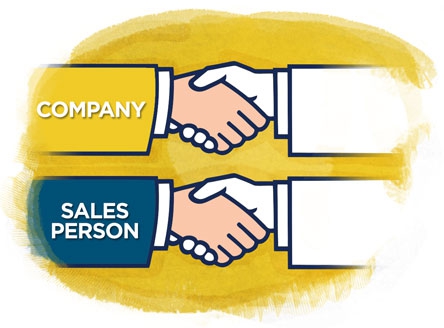Are Your Customers Buying from Your Company or Your Salesperson?

The good and bad of relationship-based sales.
The Good
Relationship-based sales methods are ideal. Most of the time those relationships are the only thing protecting you from competing solely on price. In sales training, we have a saying: “All things being equal, people buy from people they like. All things being unequal, people still buy from people they like.”
Have you ever intentionally left one place and purchased from another because of the poor service? Have you ever driven past a competitor to make a purchase from a place you like better? Of course you have. Most of the time, it is a matter of trust. We all want to like and trust the person and company which we are handing our hard-earned money.
Healthy relationships build lots of trust and in return, open and honest communication. For your business, it means higher customer satisfaction, higher margins, more repeat business, more referrals, and countless other benefits of quality relationships with your customers.
You can’t get that from traditional “always be closing” selling, a website, or a computerized voice on an 800 number. In today’s market, more than ever, relationship-based selling is what separates your company from every other one available to your prospect.
The Bad
The dangers of relationship-based selling are real, but they are also preventable. These selling relationships can be dangerous if your salesperson gets lured away by your competitor or decides to set up their own operation. How do you balance the bad with the good? How do you protect your clients and sales force from being raided by your competition? The two things from which you need to protect your business are non-competes and fair compensation.
Non-compete agreements are simple to create and implement. Run it by an attorney and make sure it is fair and legal for your industry. It doesn’t have to be super restrictive, just limit the non-compete to your industry and products, and for a reasonable time frame, usually of 1 year. Most employees won’t want to sit out a year, and you should be able to re-establish the relationship with your customer and new salesperson.
Fair compensation is a more complicated. Usually the best results for salespeople are a pay for performance model. Straight commission is ideal for the company, but may not be for the employee. In this scenario, we are assuming this is someone you want to retain and that they are generating enough sales to make compensation an issue. If they are not, let them go and find a better salesperson.
If they are worth keeping, then it is really just a math problem. The company needs to turn a profit and the salesperson needs to pay their bills. There is a break-even point for both. You just have to find them and the common ground between them. Don’t be afraid of highly paying a good salesperson, as long as the company is also profiting from each sale. If your compensation is fair to the company and the employee, there should be nothing to be gained by going to the competition, assuming they have to turn a profit too.
Both your employees and customers leave from lack of attention.
It is one of the reasons relationship-based selling works best in the first place. You and your salespeople should work hard at building and maintaining these relationships. Remember, the relationship with your client is not solely between the salesperson and the client. Your managers and customer service staff also play a big part in creating and maintaining client relations. With strong relationships, you can develop the trust and quality communication required to create win-win deals. Without them, you will have everyone fighting for what’s in it for them, and everyone will lose.








